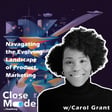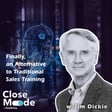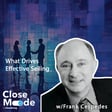
The Journey Through Evolving Buyer-Seller Dynamics w/Alice Heiman
In this episode, Brian Dietmeyer talks to Alice Heiman, founder and chief sales energizer at Alice Hyman LLC, about the critical topic of "Diagnosing Before Prescribing" in sales. They explore the common pitfalls in sales interactions where solutions are offered before a thorough understanding of the customer's unique problems is achieved. This insightful discussion delves into the evolution of buyer-seller dynamics, emphasizing the importance of understanding the buyer's self-diagnosed issues and the consequences of misdiagnosis. Alice shares her extensive experience and strategies to enhance sales approaches, making this a must-listen for sales professionals looking to refine their diagnostic skills and improve customer interactions.
Timestamps:
00:01 Introduction to the episode and guests.
00:54 Discussion on the importance of diagnosing before prescribing in sales.
01:29 Alice Heiman's perspective on customer self-diagnosis and its impact.
03:45 The evolution of buyer research and its implications for sales strategies.
10:07 The role of deep questioning and understanding in effective sales.
19:03 The necessity of guiding buyers through their decision-making process.
25:47 How sales professionals can effectively engage with well-informed buyers.
31:19 Closing thoughts and the importance of sales training in decision-making processes.














